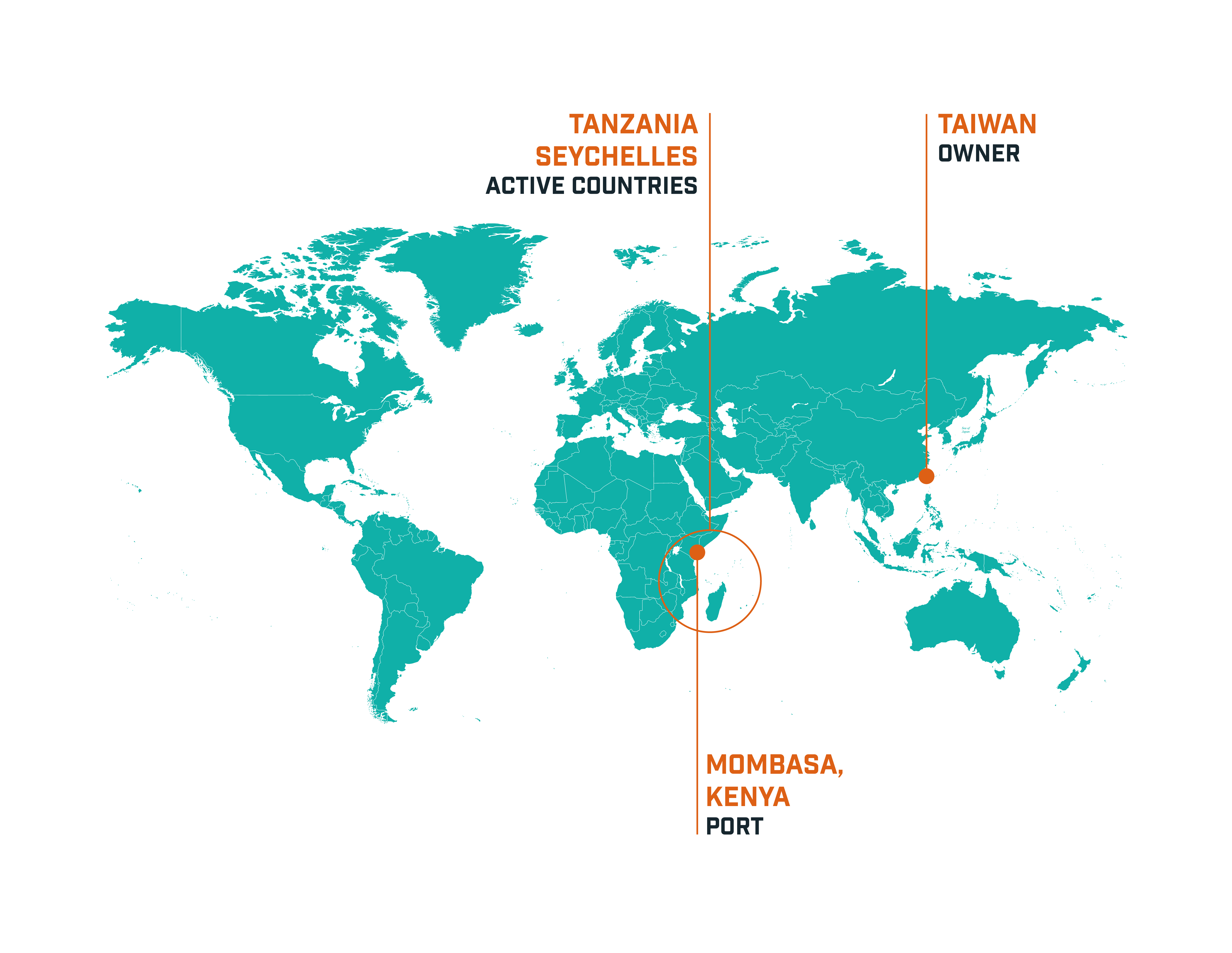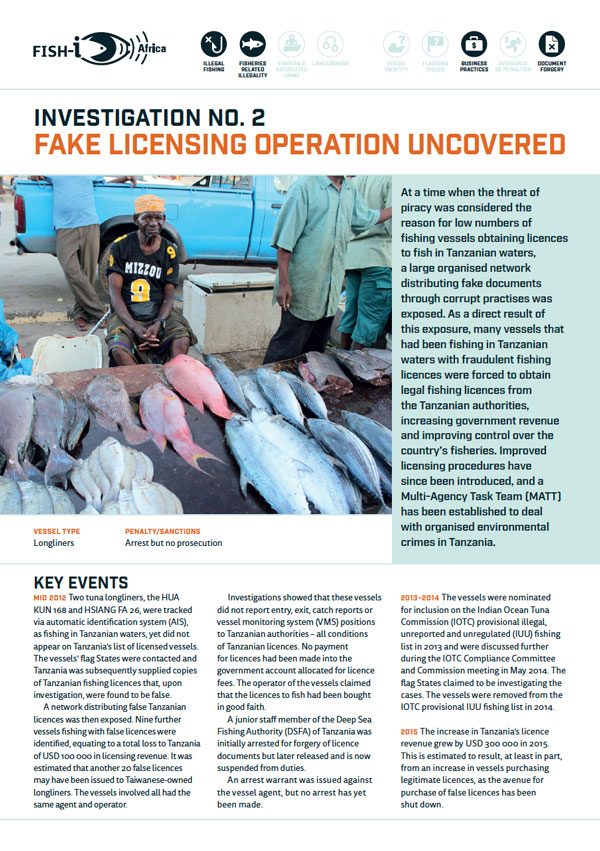INVESTIGATION No. 2 Fake licensing operation uncovered in Tanzania
At a time when the threat of piracy was considered the reason for low numbers of fishing vessels obtaining licences to fish in Tanzanian waters, a large organised network distributing fake documents through corrupt practises was exposed. As a direct result of this exposure, many vessels that had been fishing in Tanzanian waters with fraudulent fishing licences were forced to obtain legal fishing licences from the Tanzanian authorities, increasing government revenue and improving control over the country’s fisheries. Improved licensing procedures have since been introduced, and a Multi-Agency Task Team (MATT) has been established to deal with organised environmental crimes in Tanzania.
Key events
Mid 2012: Two tuna longliners, the HUA KUN 168 and HSIANG FA 26, were tracked via automatic identification system (AIS), as fishing in Tanzanian waters, yet did not appear on Tanzania’s list of licensed vessels. The vessels’ flag States were contacted and Tanzania was subsequently supplied copies of Tanzanian fishing licences that, upon investigation, were found to be false.
A network distributing false Tanzanian licences was then exposed. Nine further vessels fishing with false licences were identified, equating to a total loss to Tanzania of USD 100 000 in licensing revenue. It was estimated that another 20 false licences may have been issued to Taiwanese-owned longliners. The vessels involved all had the same agent and operator.
Investigations showed that these vessels did not report entry, exit, catch reports or vessel monitoring system (VMS) positions to Tanzanian authorities – all conditions of Tanzanian licences. No payment for licences had been made into the government account allocated for licence fees. The operator of the vessels claimed that the licences to fish had been bought in good faith.
A junior staff member of the Deep Sea Fishing Authority (DSFA) of Tanzania was initially arrested for forgery of licence documents but later released and is now suspended from duties.
An arrest warrant was issued against the vessel agent, but no arrest has yet been made.
2013–2014: The vessels were nominated for inclusion on the Indian Ocean Tuna Commission (IOTC) provisional illegal, unreported and unregulated (IUU) fishing list in 2013 and were discussed further during the IOTC Compliance Committee and Commission meeting in May 2014. The flag States claimed to be investigating the cases. The vessels were removed from the IOTC provisional IUU fishing list in 2014.
2015: The increase in Tanzania’s licence revenue grew by USD 300 000 in 2015. This is estimated to result, at least in part, from an increase in vessels purchasing legitimate licences, as the avenue for purchase of false licences has been shut down.
How?
The evidence uncovered during FISH-i investigations demonstrates different methods or approaches that illegal operators use to either commit or cover-up their illegality and to avoid prosecution.
- Document forgery: Although it is possible that more existed, 11 fake Tanzanian licences that were issued fraudulently were identified.
- Business practices: The vessel owners used an agent that bought licences from a Tanzanian fishery official, but that transferred payment to a private bank
account demonstrating corruption. Investigations to identify the beneficial owner examined company structures in Taiwan, where each vessel is ‘owned’ by a separate company, essentially making it very difficult to track the beneficial owner.

What did FISH-i Africa do?
- Tracked vessels and identified them illegally fishing.
- Investigated and identified the web of fraudulent licences.
- Advised the DSFA on charging the owner, agent and operator of the two vessels for IUU fishing.
- INTERPOL cooperation facilitated and request for cooperation and information sent from Tanzania to Taiwan.
- Briefed senior police officers and the Attorney General in Tanzania about the case.
- Continued and on-going investigations and cooperation with special police units in Tanzania.
- Investigated the vessel owners and linked people and companies.
- Undertook financial screening of relevant people and companies.
What worked?
- AIS tracks were used to identify vessels operating without licences.
- Analysis of VMS data was used to identify vessels that were not complying with licensing requirements.
- Document analysis identified forged licences.
- Cross checking of licensing information exposed the network involved in distributing fake licences.
- Committed and well trained fisheries professionals withstood pressure and threats to ensure a criminal process was undertaken.
What needs to change?
- Robust national legislative frameworks universally applied to enable enforcement actions to take place and to be followed through to prosecutions.
- Appropriate penalties for non-compliance are needed to prevent those prosecuted for illegal acts, including agents and operators, from continuing to operate in the business without appropriate sanction.
- Flag State responsibility would ensure that fishing vessels operate according to the rules when fishing in foreign waters and that appropriate action is taken when non-compliance is detected.
FISH-i Investigations
In working together on over forty investigations, FISH-i Africa has shed light on the scale and complexity of illegal activities in the fisheries sector and highlighted the challenges that coastal State enforcement officers face to act against the perpetrators. These illegal acts produce increased profit for those behind them, but they undermine the sustainability of the fisheries sector and reduce the nutritional, social and economic benefits derived from the regions’ blue economy.
FISH-i investigations demonstrate a range of complexity in illegalities – ranging from illegal fishing to fisheries related illegality to fisheries associated crime to lawlessness.
In this case evidence of illegal fishing and fisheries related illegalities were found.
